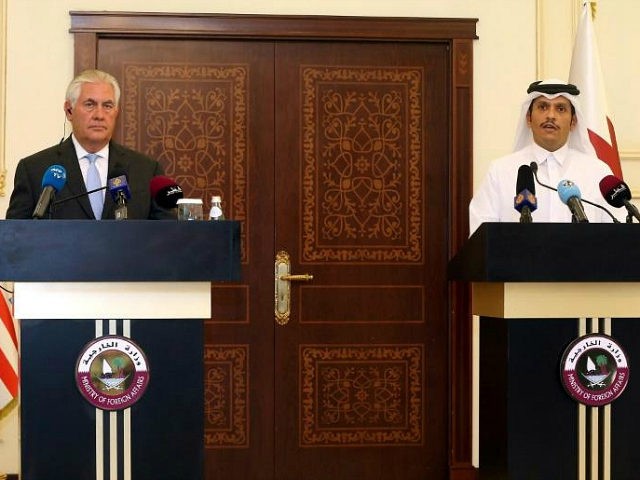The future of Qatar hangs in the balance this week.
For over four months, the Emirate has struggled under the burden of a multi-national blockade led by Saudi Arabia. focused on pressuring Qatar to cease itsfunding of terror groups throughout the region.
Just days ago, though, U.S. Secretary of State Rex Tillerson embarked on a diplomatic mission to ease the dispute, stopping first in Saudi Arabia and then, on Sunday, in the Qatari capital of Doha.
Though the Secretary of State expressed an eagerness to end the blockade and restore unity to the Gulf, the news he brought Qatar on Sunday was anything but promising.
“In my meetings with [Saudi] Crown Prince Mohammed bin Salman, I asked him to please engage in dialogue,” he began. However, Tillerson went on to lament that “there is not a strong indication that parties are ready to talk yet.”
Summing up the futility of his trip, he said “We cannot force talks upon people who are not ready to talk.”
And so, the blockade will go on.
Let it remain. So long as Qatar continues to support Hamas, it’s not a bad thing.
Why? Because ultimately, the blockade is working. To understand just how effective it has been, you don’t even have to check the news.
You could, instead, see it on the commercial reels of your favorite television shows or even on the streets of London and New York.
Last June, Qatar introduced a novelty in commercial advertising when it took out unmistakably political TV ads for its national airline. Instead of describing the luxuries of the first class seating or the host of international destinations, this Qatar Airways ad decried the airspace boundaries being enforced against it.
“There should be no borders up here,” said a voice against a blue, cloudy sky. “As an airline, we don’t believe in boundaries, we believe in bringing people together.” How the funding of genocidal militants like Hamas serves to ‘bring people together’ was left unclear.
For the past few months, as well, if one were to Google any term related to Qatar, the first website offered would be, interestingly, lifttheblockade.com. (Almost comically, just beneath it was a link to counterextremism.org, leading to a site that showcases all of the available evidence of Qatar’s support for terrorism.)
Then, just last week, walking down Central Park West, I noticed yet another ad above the roof of a taxi cab, with the words “Lift the Blockade Against the People of Qatar” printed in large block-letters above images of a fence and barbed wire. In London, Qatar took its campaign a step further, painting the same ad across the entire sides of London’s iconic black cabs. Though Al Jazeera, Qatar’s state-funded news service, claimed the campaign was an initiative of London’s transportation services, the truth was that Qatar had simply paid for it.
Qatar is obviously doing all it can to break the blockade. Which, in turn, means that the blockade is working.
And so, we ought to keep it going. After all, Qatar has got a long way to go in terms of correcting its behavior.
Thus far, Qatar has spent millions of dollars trying to buy the world onto its side with advertising. What it has not done, however, is finally repudiate the brutal Hamas thugs they’ve funded for years. This, even as Hamas leader Yahya Sinwar said just days ago that Hamas was not debating whether to recognize the Jewish State, but simply “when to wipe out Israel.” The Hamas leader added that any possibility of Hamas relinquishing control of its armed forces and missile arsenal was as useful as “Satan dreaming of Heaven.” Even the U.N. Special Coordinator for the Middle East Peace Process, Nickolay Mladenov, publicly condemned Hamas for threatening Israel’s destruction. Overcome by a fit of profound diplomatic wisdom, Mladenov noted that threatening to destroy a neighboring state in its entirety does “not serve the interest of Peace.” Hamas, he insisted, should focus instead of solving the humanitarian crisis facing the people of Gaza.
And still, Qatar not only withholds condemnation, but continues to be Hamas’s funder-in-chief, hosting the bulk of their leadership in Doha. Just last Sunday, Hamas even thanked the Qatari leadership for its “pioneering role” in bettering the lives of Gazans — which, coming from Hamas, likely refers to the building of deadly terro ttunnels and rockets meant to be fired at Israeli civilians.
When the Emir of Qatar visited New York last month for the opening of the U.N.’s General Assembly, a number of Jewish communal leaders accepted an invitation to meet with him. While some chose to meet the Emir in secret, the meetings represented a broader campaign to give Qatar a facelift amongst American Jewish leaders whom, it was assumed, might pressure Trump to go easier on the ostracized Gulf state. The agency hired by Qatar to arrange this image rehabilitation was a Jewish-owned public relations firm.
So, Hamas again this week threatens to annihilate Israel. And a group of American Jews continues to help rehabilitate the image of its funder-in-chief.
The people of Qatar are suffering due to the actions of its government. One holocaust was quite enough, and Qatari funding of a genocidal Islamist terror group must stop.
Until they do, though, we must keep the fire burning beneath the regime’s feet.
It must remain crystal clear to the men of Doha that only real change, and not paid campaigns, will ever serve to rescue them.
Rabbi Shmuley, whom the Washington Post calls “the most famous rabbi in America,” is the international bestselling author of 31 books including his most recent The Israel Warrior. Follow him on Twitter @RabbiShmuley.

COMMENTS
Please let us know if you're having issues with commenting.